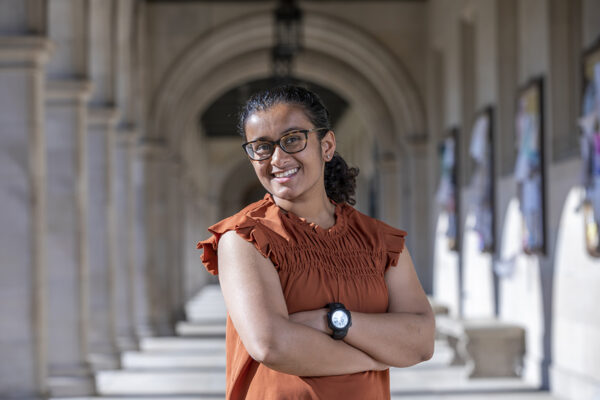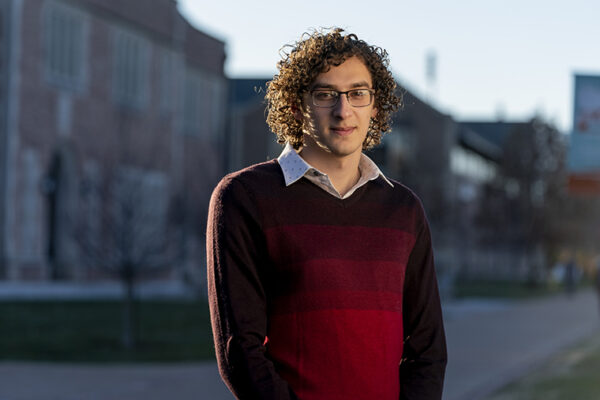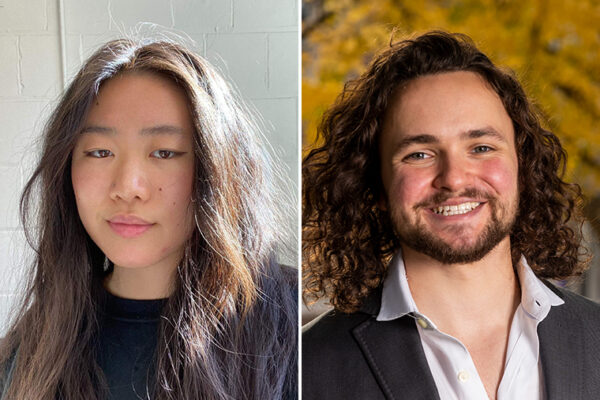Washington University in St. Louis senior Victoria “Tori” Harwell has been selected as a Rhodes Scholar, the 30th winner in university history. Harwell was among the 32 students nationwide selected Saturday, Nov. 11, to receive the prestigious honor that provides scholars the opportunity to earn an advanced degree at Oxford University.
Harwell plans to pursue sequential degrees in nature, society and environmental governance and in African studies at Oxford. Harwell, who uses both they/them and she/her pronouns, wants to use her education to empower grassroots leaders to address climate change in their local communities.
Harwell, of Denver, is majoring in African and African American studies and in environmental analysis, both in Arts & Sciences, at WashU and is both a Udall and a Mellon Mays scholar. They also are a member of the esteemed John B. Ervin Scholars Program, which has produced four university Rhodes Scholars since 2013.
Chancellor Andrew D. Martin praised Harwell for her intellectual curiosity and global commitment to a more sustainable future.
“Tori is an exceptional scholar who believes in lifting up the voices of the marginalized,” Martin said. “I’m proud of all Tori has already accomplished at Washington University, and I am confident that she will thrive at Oxford.”
Creating a grassroots movement
To address today’s climate crisis, Harwell studies its roots.
“We talk a lot about carbon footprints and our own individual behaviors like the cars we drive or using plastic straws, but the problem is a much deeper one, one that has been forming over the course of 500 years,” Harwell said. “My research looks at how colonization has dramatically changed the landscape and how we interacted with the land. Decisions made by colonial administrators hundreds of years ago continue to impact political and geographical landscapes today.”
During their years at WashU, Harwell has studied sustainable design in South Africa, supported Black farmers as a Gephardt Institute St. Louis Fellow and served as a volunteer teacher for the Organization for Black Struggle.
She also has become an expert in the unlikely but illustrative subject of the Cadbury chocolate company, traveling to both Birmingham, England, where the company is based, and Ghana, where its cocoa has been harvested for more than a century. Harwell recently discovered an early Cadbury document by employee E.J. Organ that captures the prevailing attitude that colonized lands are there to be exploited.
“Organ dehumanized the people and conceptualized land as this virgin body that had never been touched. He was just one man, but he informed an entire company,” Harwell said. “We can’t have the E.J. Organs of the world telling communities how to work. It’s not right and it’s not ethical. So, to me, the best way to make sure people don’t get left behind is to create a grassroots movement that is bottom up and not top down.”
Harwell’s profound empathy coupled with their courage to upend entrenched systems makes Harwell a changemaker, said Jodi Allemeier, one of Harwell’s instructors in Cape Town, South Africa.
“Tori stands out not just for her academic prowess, but also for her authentic character,” Allemeier wrote in her recommendation. “Her ability to comprehend and untangle the complexities of unfamiliar urban landscapes demonstrated her unique intellectual and social curiosity and ability to derive meaningful insight from classroom and field experiences.”
Ultimately, Harwell wants to help nongovernmental organizations (NGOs) leverage local wisdom to develop effective policies, whether that be in Africa, South America or Asia. They also plan to earn a law degree to help local people protect their lands. Harwell believes the cumulative effect of local efforts will lead to global change.
“There is so much to learn by understanding how people — not just Black people — are engaging with the land and reacting to climate change,” Harwell said. “I’m just one person, but I want to be part of a network of people that shifts how we think about land and our future.”

‘Working in community’
Senior Omaer Naeem was a finalist for the Rhodes Scholarship. He is majoring in global studies and minoring in Urdu and in Asian American studies in Arts & Sciences and is a Merle Kling Undergraduate Honors Fellow and a finalist for the Marshall Scholarship. Naeem also is an Ervin Scholar.
Growing up, Naeem understood little about his Pakistani identity. There were few South Asians in his small Appalachian town and certainly no other young Punjabi Muslims. But at WashU, Naeem found ways to express his Pakistani American heritage. He took the classes “Doctors and Terrorists: The Fictions of South Asian America” and “The Meaning of Pakistan,” both taught by Shefali Chandra, an associate professor of women, gender and sexuality studies in Arts & Sciences; studied Urdu; and conducted historical ethnographical research into the relationship between Pakistanis and the Pakistani state during the military regime of 1977-1988.
He found community in WashU’s Interfaith Alliance, Muslim Students Association and Sigma Iota Rho, the global studies honor society.
“I didn’t really know a lot about my own ‘history,’ but those classes taught me so much about my cultural identity and that I am connected to so many more people than I ever realized,” Naeem said.
Naeem continued his educational journey at the U.S. State Department, where he served as an intern for the Bureau of South and Central Asian Affairs. There he learned about Pakistan’s political, demographic and security challenges as well as its greatest threat — climate change. A research trip to smog-choked Lahore put the crisis in stark relief.
“The air pollution is so bad that flights to Lahore are frequently rerouted to Islamabad,” Naeem said. “As an intern, I saw some of the numbers and the data. But it’s one thing to study the problem. Living it is a totally different experience.”
To Naeem, local problems need local solutions. He wants to work with an NGO or another institution to build equitable educational initiatives that will help young people — about 70% of Pakistan’s population — understand sustainable development and design climate change mitigation and adaptation solutions that meet the unique needs of their own communities.
“To work for any community, I must be in community,” said Naeem, who continued his research as an intern at the Brookings Institution’s Center for Universal Education and at the Atlantic Council. “The young people of Pakistan are really passionate about these issues, but they don’t feel any sense of agency. My goal is to promote people’s opportunities to control their destinies in ways that are meaningful and resonate with their cultures, values and traditions.”



